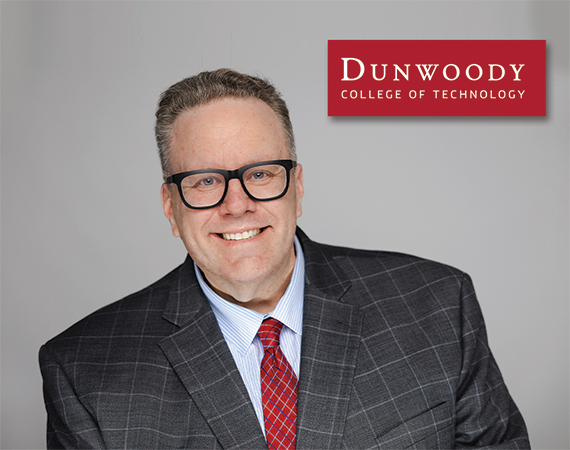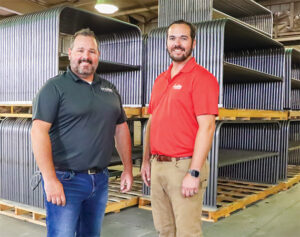Scott Stallman became president of Dunwoody College of Technology in Minneapolis in July 2024 after serving as provost since 2021. A private not-for-profit institution focused on technical and skilled trade education, Dunwoody is unique in a field where nearly all similar colleges are public institutions.
What originally attracted you to Dunwoody?
Scott: I’ve spent over 20 years in higher education at a variety of schools, both public and private, with the majority of my career at two-year public community and technical colleges in Illinois, Texas, and now Minnesota. As I grew in the field, I started to look at some of the big issues in higher education and how we can address the larger systemic problems: debt, access, the opportunity gap, and the shortage of skilled trades in the labor marketplace. All of those things are passions of mine and areas I try to effect change in.
When I was looking for my next opportunity, I researched which colleges were doing these things well, and I came across Dunwoody. It’s this interesting non-profit college, and honestly, I wondered how it even existed. It’s providing similar degrees and programs as other public technical colleges, but in ways that are much more student-centric. I looked at the strategic plan and I realized, that’s it. We are hyperfocused on mission, and our mission is to prepare students for high-pay, high-demand jobs.
How does that mission-focused approach translate into how Dunwoody operates?
Scott: It means when a program isn’t working for students anymore, if students are no longer getting good, high-paying jobs when they graduate, we sunset that program. We are comfortable parting ways with it so we can put our resources into other programs that are seeing that return on investment. That means we feel good about all of the programs we offer, even at our price point, knowing that students are going to get great jobs in great fields. And we’re always willing to make changes. Our program advisory committees, which are stacked with representatives from industry, meet with our faculty twice a year to discuss what’s new and what’s needed in each of the fields where we have programs.
We also take pride knowing that students are prepared and ready to make an impact in their field from their first day on the job. We take a very hands-on approach from the first semester; and we’re lab heavy. Our students tend to start working really quickly, especially in manufacturing. Often, they’re working in the field by the end of their first year, getting tuition help from employers.
Your enrollment has increased during a time many private colleges have lost students. What’s behind that growth?
Scott: As the price of higher education has gone up, more people are rightly asking about the return on investment. If you don’t choose a program that is going to have that return on investment, it can be a decision that affects the rest of your life. I think it used to be that people were looking more at an institution, but now I think folks are considering not only the institution, but also the program — and the career that follows.
This leaves Dunwoody in a really favorable position, because we only offer programs in high-pay, high-demand fields. It’s one of the reasons I came to Dunwoody, and it’s why we’ve gone from about 1,240 students when I started three and a half years ago to well over 1,500 this fall.
We also have a 95% job placement rate in their field of study. Employers want to hire our students. We had almost 200 employers come to our spring career fair last year, and we only had 500 students graduating. And, those employers pay a fee to be here. It’s astonishing.
What gets you excited about manufacturing education and the future manufacturing workforce?
Scott: I’m excited to work with manufacturers to help change the way these fields are viewed by students and parents — and counselors in high schools. Often students will go into a counselor’s office with a lot of ideas about their future. They don’t want to work behind a desk. They want to be on their feet solving problems every day. They want to work in a fast-paced environment. They want a high-paying job but don’t want to go to school for four years. That counselor often will direct students to the health sciences — nursing or respiratory therapy or radiology. Those fields are in high demand, and we do offer a Radiologic Technology program that has a waiting list, but there are great careers in advanced manufacturing and skilled trades that are left out of the conversation way too often.
It’s an image problem. When people picture a manufacturing facility, they are not always picturing modern manufacturing in America. The facilities I’ve toured are high-tech, clean, well-run, and safe. They are unbelievable working environments where there’s endless opportunity for advancement.
We have so many examples of Dunwoody graduates who came out of a machining program, or any of our advanced manufacturing programs, and they started working for a company and then started their own businesses. They’ve become entrepreneurs and have gone on to amazing careers. It’s limitless.
Students at a younger age need to find out these fields offer tremendous opportunities for them. I don’t think that story gets told enough, and I’m excited to be an outspoken advocate for manufacturing.
Return to the Winter 2024 issue of Enterprise Minnesota® magazine.


